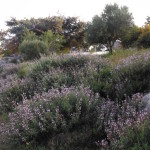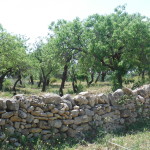On my recent visit to Sicily and Crete I was reminded repeatedly of the place, in South Australia, where I grew up. Looking at a hillside of olive trees in Sicily, I would find myself in a primary school geography lesson, lost in pictures of ‘the Mediterranean’. I couldn’t now say if my fascination with ‘the Mediterranean’ had been a fascination with places in the Mediterranean or with South Australia’s classification as ‘Mediterranean climate’. But, while in Sicily and Crete, I had an overwhelming feeling that these seemingly faraway places were somehow inextricably connected with the place of my childhood.
I recalled the streets of my childhood lined with olive trees, and the ‘migrant’ families out picking the fruit; and, my father bringing home ox-heart tomatoes, gifts from his ‘Italian’ market-gardener patients, people with wonderfully exotic names like Mr Fantasia and Mr Caruzzo. I recalled too the fig and almond trees in our back garden, and the coastlines of stark hills dropping to seas of translucent turquoise.
On reflection, ‘recall’ and ‘being reminded’ don’t do justice to what I was experiencing when in Sicily and Crete. I couldn’t take my eyes off the trees and herbs and rocks and seas I was experiencing: I was in them; they felt part of my very being. What was happening was more intense than either memory or comparison of places. It felt like a home-coming. 
‘So this is my heritage’, was my initial thought. Here is where the taken for granted olive and almond trees of my childhood come from. Here is where the olive picking and vegetable growing practices of those rather exotic and ever so friendly people come from. And here is where Odysseus, Icarus, Arethusa of the children’s books on legends of Greece and Romes come from. Now that I was in these places in ‘the Mediterranean’, I could identify with the lessons and experiences of childhood.
But there was more than this to the home-coming and sense of childhood that I was experiencing. Where, for example, was home? It didn’t feel like a place locatable on a map, anywhere in Australia or Italy or Greece. If ‘home’ included these places, past and present, it was something more than even their sum. Coming home felt like that deeper experience of ‘I know this already; I’ve always known this’, an experience which defies any attempt to locate the ‘this’ in space or time.
And, as this was an experience of being in childhood, it begs the question of when and where was or is my childhood? While memories of my biographical childhood in Adelaide in the 1950s had been prompted, the childhood that I was experiencing when, say, absorbed in olive trees in Sicily, was a childhood very present and alive now. Indeed, as soon as I tried to pin the memories down to a place and time in biographical childhood, the experience would be diminished. So, although this childhood included my actual childhood, it was more than this, a childhood that doesn’t recede as chronological time passes.
Here was an experience, then, of memory opening to a timeless realm beyond memory, a realm where places feel always known, and, how ever distant from each other on a map, intimately connected. Here, in this immemorial realm of childhood, I found a sense of belonging and aliveness. But realized too, that it’s not a matter of ‘going back’ anywhere to find these: they are always potentially present.
Ann

Thank you for sharing the beauty and wonder of childhood experience and the mystery and magic of memory.
Rosalind